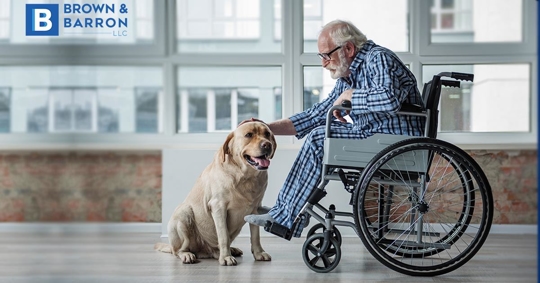Studies have shown that pets provide a measurable health benefit to their owners. Pets reduce anxiety, encourage exercise, elevate our production of serotonin, and reduce the production cortisol, all which contribute to improve our health. Pets can also play a significant role in the recovery process as therapy for a variety of ailments of mind and body, including the victims of stroke.
A stroke occurs when blood vessels in the brain are blocked or rupture, starving the brain of critical oxygen and nutrients. According to the Centers for Disease Control and Prevention (CDC), more than 795,000 people will suffer a stroke this year, which equates to one stroke every 40 seconds.
The Impact of a Stroke
The damage caused by a stroke depends on the intensity and location of the stroke within the brain. Time is also an enormous factor, and the prognosis for the stroke victim often depends on how long it takes to recognize the signs that a stroke has occurred and how long it takes to get proper medical attention.
In 10% to 20% of strokes, the victim dies. For the survivors, the resulting damage to the brain can lead to severe disabilities. The disabilities include a loss of motor function and mobility (the ability to get up and get around), reduced ability or inability to speak and understand, and increased anxiety and depression.
Fortunately, some of the crucial daily functions that have been lost due to stroke can be re-learned with rehabilitation. This is where pets and therapy pets can play a vital role.
Three Ways Pets Help with Stroke Rehab…
- Provide Motivation for Mobility & Motor Skill Recovery
After a stroke you can instantaneously lose the ability to walk and manipulate objects with your fingers, such as a fork or a pen. The process of rehabilitation can be long, frustrating, and even painful. When you add a pet to the equation, it can make the work easier and more successful. For instance, people who are working to walk again, tend to go farther when walking with a dog without even noticing it because their focus is on the dog. Brushing a cat is known to be a great way for stroke victims to recover fine motor skills. Pets can transform rehab therapies and exercises from a dreaded chore to a positive experience they look forward to.
- Help With Aphasia
Aphasia is the loss of the ability to speak, and it is a frustrating and isolating aspect of life for many stroke victims. Even when the brain is sharp enough, many stroke victims simply cannot make the connection to form the words they want to say. With rehab, this skill can be restored. Dogs are great at understanding nonverbal communication, including hand signals and facial expressions. A dog can often understand what we mean with even a single word. Dogs give stroke victims a naturally talented partner to work with when relearning the power of speech.
- Reduce Loneliness & Depression
A loss of mobility and the loss of speech can make the stroke victim feel isolated and alone. This can lead to depression and anxiety. Pets help provide companionship to stroke victims to help them get through these tough times. Physical damage to the brain can also cause personality changes or new levels of anxiety or depression. Once again, pets have been shown to induce chemical reactions in our bodies, that reduce stress-inducing hormones and give us a sense of wellness and calm.
Pet Therapy Options for Stroke Victims
Remember that the key to improved recovery to a stroke is to identify the signs of the stroke so that you can call 911 immediately. If you or a family member has suffered a stroke and you would like to consider pet therapy, you should consider Pets on Wheels, the Alliance of Therapy Dogs, Pet Partners, or Therapet.
Do You Suspect Malpractice Related to a Stroke?
Most strokes are the result of poor cardiovascular health. However, there are situations where an unexpected stroke occurs during a medical procedure and other situations where the treatment of a stroke does not match the established standard of care. In these cases, it requires independent medical experts to determine if the stroke or the damage of a stroke could have reduced or avoided with the right medical decisions and care. The physical, emotional, and financial toll of a stroke is hard to imagine, so it is vital to get an expert to determine if malpractice has occurred and to get financial justice if it is owed to the victims and their families. For experts in stroke-related medical malpractice in Maryland and Washington, D.C., contact the award-winning legal team of Brown & Barron for a free, no-obligation consultation at 410-346-0206 or by contacting us online.


